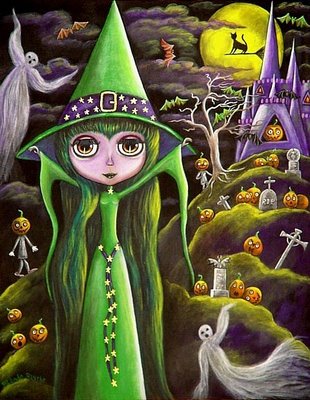
Halloween is one of the oldest holidays still celebrated today. It's origins go back thousands of years and has been influenced by many cultures.
The original celebration from which Halloween sprang was Samhain (sow-en), the Celtic New Year. When the Romans invaded Britain they brought with them their own customs and festivals. One festival known as Pomona day was celebrated at the same time as the Celtic New Year. Pomona was the Roman goddess of fruits and gardens. During the Roman occupation the two festivals became one and began to share customs. It is to the Roman festival of Pomona that we can thank for the tradition of 'dooking for apples'.
In recent times many members of the church have been critical of people celebrating Halloween, believing the holiday to be evil. It is strange then to think that the church created the Halloween we know today. When the first Christian missionaries travelled across pagan Europe and Britain they did not attempt to change the ancient ways but instead incorporated the beliefs into the Christian ideology.
In 835 AD the Roman Catholic church made November the1st, the Celtic New Year, a religious holiday in honour of all the Saints. This day was called All Saint's Day, or Hallowmas, or All Hallows. The day after All Saints day the church made All Souls Day to honour the dead. On that day people would light bonfires and parade through the villages dressed as ghosts or skeletons, saints, angels and devils. October the 31st then became known as 'All Hallow Even' which evolved over time to 'All Hallow's Eve, then to Hallowe'en and finally to the name and spelling we use today - Halloween.
For most of us Halloween is a time to dress up, party and have some scary fun, but to some members of society it still holds spiritual significance. The rise of new wave religions, with their tendency to follow the old ways and worship nature and the seasons, has returned Halloween to its original Celtic status.
Modern Traditions Of Halloween
The American tradition of "trick-or-treating" probably dates back to the early All Souls' Day parades in England. During the festivities, poor citizens would beg for food and families would give them pastries called "soul cakes" in return for their promise to pray for the family's dead relatives.
The distribution of soul cakes was encouraged by the church as a way to replace the ancient practice of leaving food and wine for roaming spirits. The practice, which was referred to as "going a-souling" was eventually taken up by children who would visit the houses in their neighborhood and be given ale, food, and money.
The tradition of dressing in costume for Halloween has both European and Celtic roots. Hundreds of years ago, winter was an uncertain and frightening time. Food supplies often ran low and, for the many people afraid of the dark, the short days of winter were full of constant worry. On Halloween, when it was believed that ghosts came back to the earthly world, people thought that they would encounter ghosts if they left their homes. To avoid being recognized by these ghosts, people would wear masks when they left their homes after dark so that the ghosts would mistake them for fellow spirits. On Halloween, to keep ghosts away from their houses, people would place bowls of food outside their homes to appease the ghosts and prevent them from attempting to enter.
The majority of Christians ascribe no doctrinal significance to Halloween, treating it as a purely secular entity devoted to celebrating imaginary spooks and handing out candy. The secular celebration of Halloween may loom larger in contemporary imagination than does All Saints Day.
The mingling of Christian and Pagan traditions in the development of Halloween, and its assumed preoccupation with evil and the supernatural, have left some modern Christians uncertain of how they should react towards the holiday. Certain fundamentalists and evangelical Protestants, along with some Eastern Orthodox Christians as well as conservative Jews and Muslims, strongly object to the holiday and refuse to allow their children to participate, citing its pagan origins (and, in some cases, its Roman Catholic connections) as well as what they regard as its Satanic imagery. In some areas, complaints from fundamentalist Christians that the schools were endorsing a pagan religion have led the schools to stop distributing UNICEF boxes at Halloween. Another response among conservative evangelicals in recent years has been the use of Hell houses or themed pamphlets (such as those of Jack T. Chick which attempt to make use of Halloween as an opportunity for evangelism.
Other Christians, particularly Roman Catholics, continue to connect the holiday with All Saints Day. Some modern Christian churches commonly offer a fall festival or harvest-themed alternative to Halloween celebrations. Still other Christians hold the view that the holiday is not Satanic in origin or practice and that it holds no threat to the spiritual lives of children: being taught about death and mortality actually being a valuable life lesson. Fr. Gabriele Amorth, the senior Gabriele Amorth, the senior exorcist of Vatican City, said in an interview with The Sunday Telegraph, "…if English and American children like to dress up as witches and devils on one night of the year that is not a problem. If it is just a game, there is no harm in that."
Likewise, to many Protestant churches, October 31 is also the date of Reformation Day, a minor religious festival. Some families, churches, and religious schools combine the holidays.
Objections to celebrating Halloween are not limited to those of the Abrahamic religions. Some members of the Wiccan religion feel that the holiday is offensive to real witches for promoting a stereotypical caricature of a witch. Additionally, many Wiccans and other neo-Pagan adherents object to Halloween as a vulgarized, commercialized mockery of the original Samhain observances.
No comments:
Post a Comment